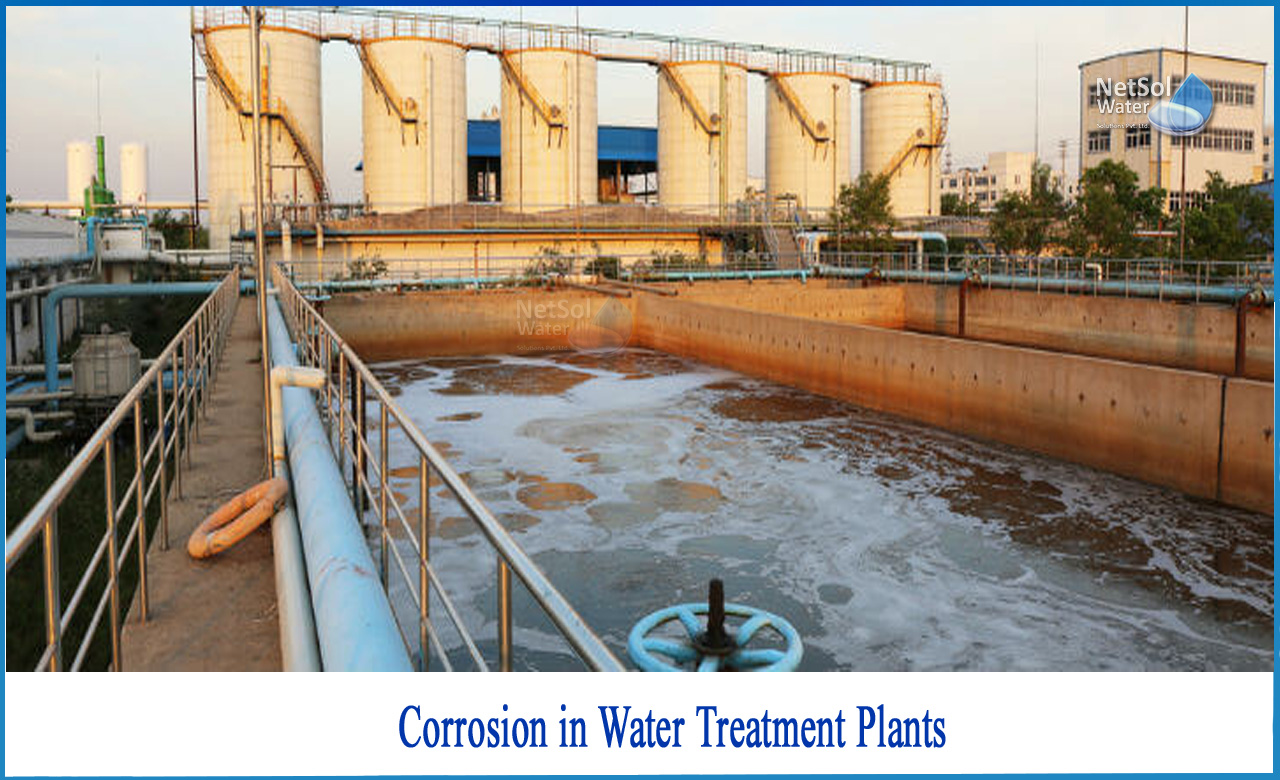How does corrosion occur in Water Treatment Plants?
Corrosion occurs when metal in pipes or tanks rusts as a result of the corrosive action of water or soil. The build-up of calcium carbonate on the inner surface of the water treatment equipment pipes or tanks causes scales. Corrosive water, also defined as aggressive or unstable water, has a tendency to erode (rust) metal in pipes and tanks.
Scale-forming and corrosive waters are on opposite extremities of a spectrum. The position of water along this spectrum is influenced by a multitude of factors. Corrosion control in water treatment aims to make the water stable so that it does not corrode pipes or produce scale.
Characteristics of Primary Water
The chemical qualities of the water running through a pipe, such as alkalinity, hardness, and pH, will influence the corrosive reaction.
|
Corrosive Water |
Scale Forming Water |
|
Low pH |
High pH |
|
Soft or with primarily non carbonate hardness |
Hard with primarily carbonate hardness |
|
Low alkanity |
High Alkalinity |
Secondary Characteristics of Water
The corrosion process is also influenced by other chemicals and molecules found in water, such as oxygen, carbon dioxide, and dissolved solids. At the cathode, oxygen combines with hydrogen gas, creating depolarization and hastening corrosion. As a result, water with a high dissolved oxygen content will be corrosive. Other oxidising agents, such as nitrate and chlorine, can also do the job, although they're less prevalent. Corrosion is also caused by carbon dioxide in water. Carbonic acid is formed when carbon dioxide gas reacts with water, lowering the pH of the water, which promotes corrosion. In most cases, dissolved materials are present in water as ions.These ions make the water more electrically conductive, making the electrolyte more effective. As a result, the rate of corrosion will rise.
Primary/Physical Characteristics of Water
Physical parameters such as temperature and flow velocity will influence corrosion in addition to the chemical qualities of water. Temperature accelerates the rate of corrosion in the same way that it accelerates the pace of most other processes. The impact of temperature on corrosion, on the other hand, can be more complicated. The solubility of calcium carbonate in water is reduced by high water temperatures, which promotes scale development and slows corrosion. Corrosion takes on several forms depending on the temperature. Cold water tends to generate pits and tubercles, whereas hot water promotes uniform corrosion. Because uniform corrosion that spreads throughout a pipe's whole surface is significantly less hazardous than tuberculation, high temperatures can appear to delay the corrosive process.
The effects of flow velocity on corrosion are similarly complicated. The most favourable flow rates are those that encourage the production of scale without shattering loose tubercles. Due to the prevalence of oxygen concentration cell corrosion, corrosion is enhanced at low flow velocities and tends to take the form of tuberculation. Abrasion of the water against the pipe at very high flow velocities tends to wear the pipe away in a different type of corrosion. High flow velocities also remove protective scale and tubercles, as well as increase the amount of oxygen in contact with the pipe, all of which accelerate corrosion.
Bacterial Effects of Corrosion
Corrosion can be caused by bacteria as well as accelerated by bacteria. Bacterial colonies on pipe walls, in general, cause greater pitting and tuberculation by accelerating corrosion below them due to oxygen cell concentration. Some bacteria, like humans, create carbon dioxide, which when combined with water forms carbonic acid, which accelerates corrosion. Iron bacteria also prevent calcium carbonate scale from forming on pipe walls. Sulphate-reducing bacteria emit an unique rotten egg odour in addition to producing corrosion.
The Take-Out
Simple practices, such as the use of galvanized ferrous metals, robust or high-performance coatings, and prudent protection of vital components, along with Reverse Osmosis Equipment’s and Water Softeners, provide a cost-effective solution that can be easily incorporated into a water or wastewater plant's operations and maintenance programme, obviating the need for extreme corrosion protection for building elements and equipment’s in most cases.
Technical assistance and guidance
Netsol Water collaborates with a wide range of international organizations to tackle complicated problems by strategically integrating modern treatment technology with practical solutions.
Netsol Water is Greater Noida-based leading water & wastewater treatment plant manufacturer. We are industry's most demanding company based on client review and work quality. We are known as best commercial RO plant manufacturers, industrial RO plant manufacturer, sewage treatment plant manufacturer, Water Softener Plant Manufacturers and effluent treatment plant manufacturers. Apart from this 24x7 customer support is our USP. Call on +91-9650608473, or write us at enquiry@netsolwater.com for any support, inquiry or product-purchase related query.



